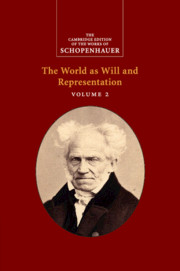Chapter 31 - On Genius
Published online by Cambridge University Press: 30 June 2022
Summary
The predominant capacity for the mode of cognition described in the two preceding chapters, which gives rise to all true works of art, poetry, and even philosophy, is what we properly call by the name of genius. Since this form of cognition has the (Platonic) Ideas as its object, grasping these not abstractly but only intuitively, then the essence of genius must lie in the perfection and energy of intuitive cognition. Accordingly, the works we most decisively hear described as works of genius are those that proceed immediately from intuition and appeal to intuition, which is to say those from the visual arts, and then from poetry, where intuitions are mediated by the imagination. – The difference between genius and mere talent is already noticeable at this point since talent is a privilege that lies more in the greater skill and acuity of discursive cognition than in intuitive cognition. Someone gifted with talent thinks more quickly and correctly than most people; genius on the other hand sees a different world from all of them, although only insofar as it looks more deeply into the world shared by everyone, because this world presents itself in the head of the genius more objectively and hence more purely and more clearly.
The intellect is by its nature merely the medium of motives: accordingly, it does not, in the first instance, grasp things beyond their relation to the will, whether the relation is direct, indirect or possible. This is most striking in animals, where the relation to the will is almost always direct, thus: nothing exists for animals unless it stands in some relation to their will. That is why we are sometimes amazed to see that even clever animals utterly fail to notice something quite obvious, for instance they do not register any lack of familiarity given obvious changes to our person or surroundings. In normal people there are in addition indirect and even possible relations to the will, which together constitute the sum of all useful knowledge; but here too, cognition remains at the level of relations.
- Type
- Chapter
- Information
- Schopenhauer: The World as Will and Representation , pp. 393 - 415Publisher: Cambridge University PressPrint publication year: 2018

